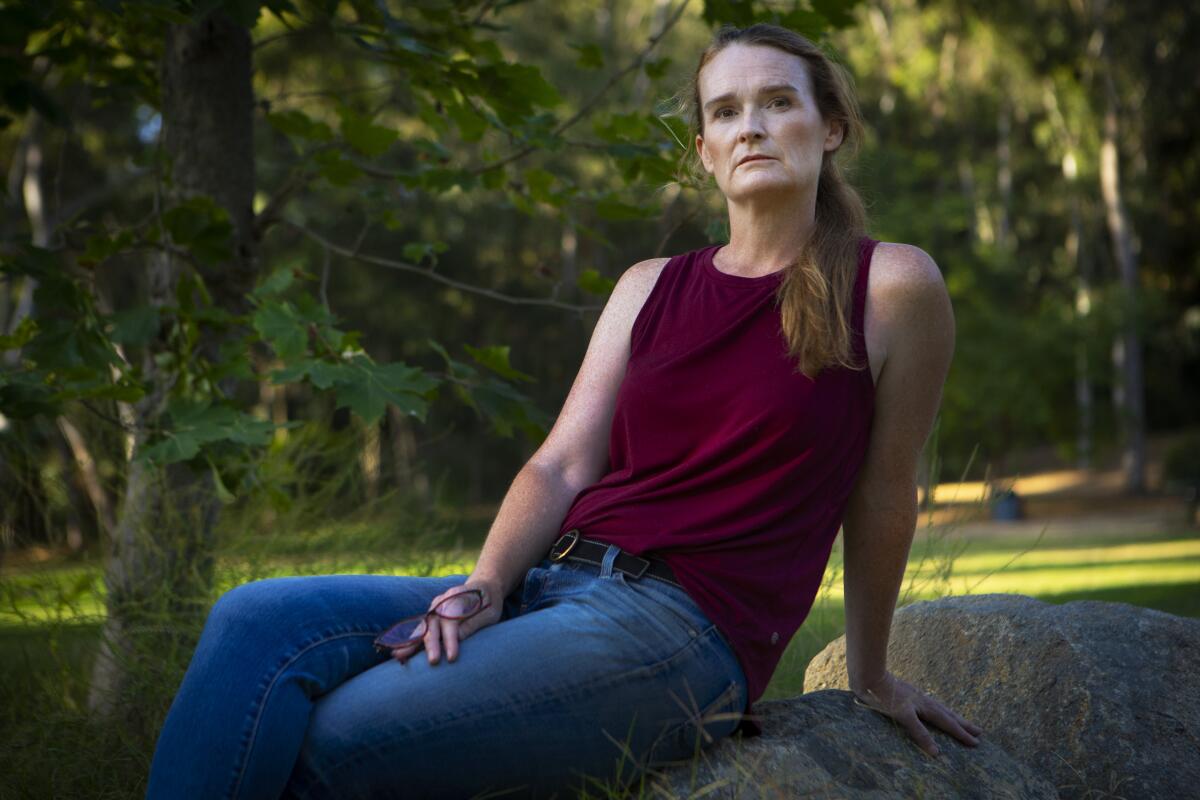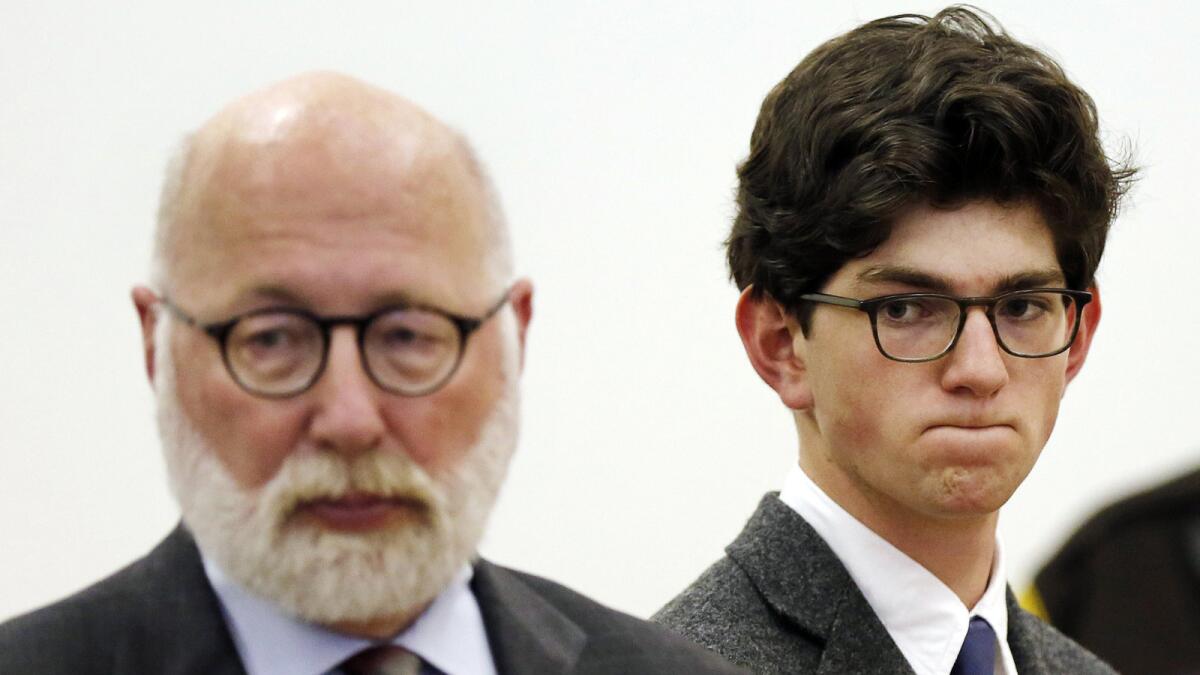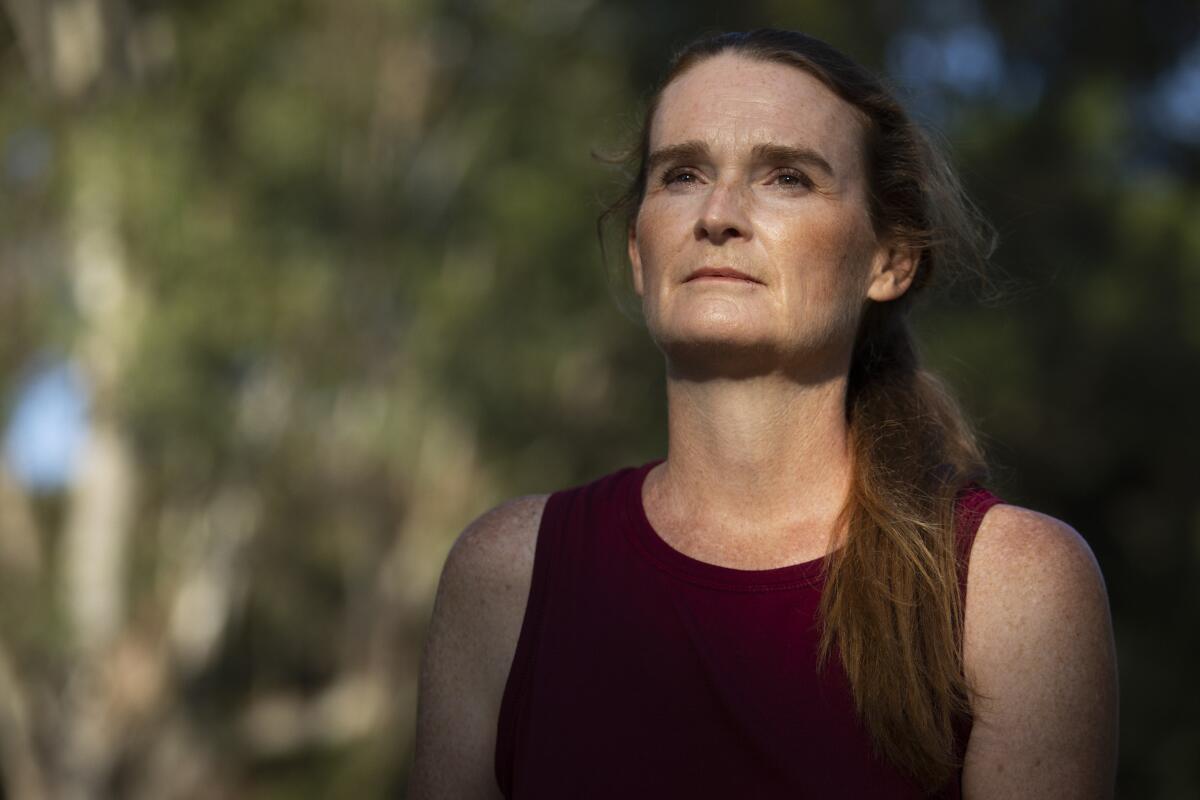Lacy Crawford was told ‘rape stories are a dime a dozen.’ She wrote hers anyway

- Share via
Decades had passed since Lacy Crawford really thought about the night it happened. She lived on the other side of the country now, in a home near San Diego with palm trees outside her bedroom window. She was in her 40s, married, with three young boys. She had put both physical and emotional distance between herself and St. Paul’s, the elite New Hampshire boarding school she attended as a teenager.
But when she started to probe her memory for details of what transpired on the 2,000-acre campus in the fall of 1990, she vomited. Her children asked what was wrong, and she told them she had the stomach flu. They were too young for Crawford to explain that she was working on a memoir about how, when she was 15, two senior boys summoned her to a dorm room and sexually assaulted her.
In “Notes on a Silencing,” out this week, Crawford describes being held down on a bed by the seniors as their genitals “penetrated her throat past the pharynx.” As a result of the assault — which the young men boasted about to peers — she contracted oral herpes.
When she told her mother about it months later, at the end of her junior year, her parents sprung into action, spending hours on the phone with school representatives. But without even speaking to Crawford, St. Paul’s told her family that they had determined the encounter was consensual. Further, they argued she was promiscuous — “not a good girl,” one high-ranking official told her father. The only way she could return to school for her senior year was to drop the issue.
In a statement, St. Paul’s current rector, Kathleen Giles, did not address these claims but said she admired Crawford’s courage and respected her voice. “And we honor her desire that the school acknowledge its failings, accept responsibility, and work, not just promise, to do better, so that all the students in our care can feel and be safe and comfortable at school,” Giles said.
Crawford did eventually return to St. Paul’s for her senior year. She feared for her future: She was planning to apply to Princeton University, where she would later be admitted. She didn’t know at the time that she was one of many students who would later claim they had been abused at St. Paul’s. The revelations came after the 2015 case of Chessy Prout, a St. Paul’s freshman who said she was raped by a male senior, Owen Labrie. (He was sentenced to a year in prison on misdemeanor charges.) In 2017, the New Hampshire attorney general began a 14-month-long criminal investigation into St. Paul’s, ultimately coming to a settlement agreement that places the school under government oversight for up to five years.

During the attorney general’s investigation, Crawford unearthed old medical and criminal records and found new motivation to return to her writing. She’d been wanting to tell her story since she was a sophomore at Princeton, when Toni Morrison encouraged her to turn a piece of writing about the assault into a book. But a few years later, when she submitted a draft to a high-profile literary representative at a top New York talent agency, she was rebuffed.
“I don’t think I can sell this,” Crawford said she was told. “Date rape stories are a dime a dozen.”
Nearly 20 years later, Crawford’s memoir is being published. From her home in Rancho Santa Fe, Crawford, now 45, spoke to The Times earlier this week.
How would this story have been different had it been published 20 years ago?
At the time, I couldn’t tell the story in a way that was satisfactory to me or the few people I showed it to. So I gave up. I was in a bad way for many years, because I had been completely torn apart in high school. The experience of what the administration did to me was, in so many ways, worse than the physical violation itself. By the time I dug myself out and was married and started having children, I never would have written about this. Absolutely not. My children don’t know about it. It’s not on Google. But I joined the state investigation and we discovered what we discovered and they buried it again, and I thought, “The hell you do.” I couldn’t be silenced twice.
You write in such detail about your high school years. Did you keep journals?
Not really. I kept quote books. I wasn’t able to tell myself what was happening at the time. I did not permit those words to enter my head. And after I graduated, I tried everything I could to put it behind me. I haven’t been rehearsing these memories. There were things I remembered when I was writing that I hadn’t remembered since then. I think it was almost encased — a paperweight of Gothic misery. I wasn’t able to imagine myself with any compassion previously. None at all. Until 2017.
To someone unfamiliar with St. Paul’s, how would you describe its power?
It’s a school that was founded by and for rich white boys of a certain heritage. That is largely unchanged. So of course they now accept girls and students of color, and some people would say that represents progress, but I’m not sure the school’s character has evolved. It is very much a legacy institution. So if you did not grow up hearing about St. Paul’s, if your dad or grandfather or half of your town didn’t go there, and you show up, you feel as if you don’t belong. And a lot of people work like hell to try to prove that they do belong. I think a lot of proving it is demonstrating that you have no vulnerability and no needs. So people were not able to be forthcoming about things that were painful or challenging. And I think that added to the shame.
Were you worried about going up against the school?
As a student, you learn pretty quickly the lists of illustrious names that are literally carved on the wall. Many of them are in very senior positions in just about every industry and cultural space you can imagine. I wrote this book pretty quickly. We weren’t very public about putting it into the world. I’m told — I can’t prove this — that a trustee of St. Paul’s got a copy of it in PDF, printed it out and distributed it to all the trustees. It went to the current rector, the former rector, the school’s attorneys. And from there to the state attorney general, various advocacy groups. It was everywhere. I was still fact-checking. My parents hadn’t read it yet.
[Sarah Aldag, the director of communications at St. Paul’s, acknowledged to The Times that “trustees and faculty members received early copies of the book through their own literary agents and shared it with the Rector and other board members.”]
Boarding schools have long been immortalized in literature and film. Why do you think we find them so intriguing?
I think it holds many of the hallmarks of some of the best children’s stories: a deep, dark forest of unimaginable mystery and riches, and there are no parents there, so you’re going to have to figure this out. And that’s not far from true. I think when you combine that sense of self-importance with those resources and the absence of supervision and keep people up very late at night, you’re likely to have a lot of things happen. I guess I got lucky that it happened to me at a boarding school. This is a horrible thing to say, but it’s a sexier rape story if it happens at boarding school. And I say that knowing that that is a vile phrase.
Do you think the way we treat sexual assault survivors has changed since you were 15?
It’s a very big question. Obviously, there’s been this unmasking of key individuals, and I think there are much larger segments of society that are willing to listen to women, or indeed anyone, who comes forward with a story of assault or harassment or abuse. I still think that when you get right down to it, it is ultimately much easier for an institution to find some way to depict the individual as problematic than it is to admit that the institution has to change. Because that implicates everyone.

You came forward with stacks of documents to corroborate your account. But many survivors are now comfortable sharing their stories on social media. How do you feel about that?
If it were the case that every victim who came forward was investigated in a straightforward and transparent way — if we had a criminal justice system that was supportive of victims — then I think we could be having a very different conversation. But we don’t have that. … We whisper because we don’t have the ability to be heard otherwise. If we had the baton here, nobody would be taking to Twitter. Will people abuse that? Of course. People are going to abuse everything. But for the most part what we’re seeing is a form of protest, because we don’t have the main channels of power open to us just yet.
You say you wrote the book, in part, to walk alongside your 15-year-old self. What would you tell that girl now?
When this happened to me, I was furious with myself for going to the boys’ room. I was furious with myself for not knowing how to stop it. I was furious with myself for being sick. I thought it was God striking me down. I was very pious. I assumed so much agency over my experience. And to really walk with that girl is to know — she knows what she’s feeling inside, but she has no idea what is surrounding her. She has no idea the history of the decades of assault before her. She has no idea that all of this goes on all the time. And that those boys made a bet: That they could get away with assaulting me and nothing would happen to them. And they were right. That is not about correction. It’s about clarity. I’m not looking for remedy. But knowing helps.
Does it also help her get rid of the shame?
I carried shame for a long time, and I’m very finished with it. It’s funny, because people say, “You’re so brave.” And that started to irritate me a bit. We tell a firefighter that he or she is brave because we know fire burns. We tell a marine “You’re brave” because we know you’re gonna get shot at. What is dangerous for me about telling this story? It’s not that they’re saying, “Do you think the boys are going to come after you?” For the most part, it’s, “Gosh, won’t that be embarrassing, or won’t you feel shame?” And that’s not mine. That was never mine. I didn’t hurt anyone.
More to Read
Sign up for our Book Club newsletter
Get the latest news, events and more from the Los Angeles Times Book Club, and help us get L.A. reading and talking.
You may occasionally receive promotional content from the Los Angeles Times.







